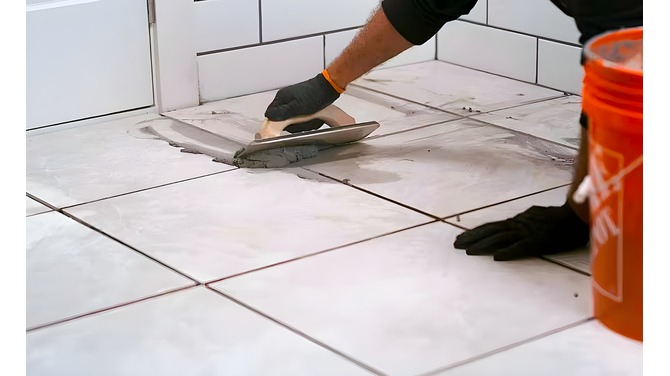Epoxy Grout vs Cement Grout: Which is Best for Your Project?
When it comes to tiling projects, one of the most important decisions you’ll make is choosing the right grout. The debate over Epoxy Grout vs Cement Grout has been ongoing, and the choice depends on factors like durability, ease of use, and budget. Whether you’re working on a residential bathroom or a commercial kitchen, understanding the differences between these two types of grout can help ensure the success of your project.
At Redwop, we’re dedicated to providing a wide range of high-quality construction chemicals, including products designed to make your tiling projects durable and visually appealing. Let’s explore the key differences between Epoxy Grout vs Cement Grout and help you decide which is the best fit for your needs.
What Is Epoxy Grout?
Epoxy Grout is a modern alternative made from a blend of epoxy resins and fillers. Unlike its cement-based counterpart, epoxy grout is non-porous, making it highly resistant to stains, moisture, and chemicals. It’s especially popular for areas prone to spills, heavy foot traffic, or high humidity, such as kitchens, bathrooms, and swimming pools.
Epoxy Tile Grout is known for its durability and long-lasting performance. It is ideal for both indoor and outdoor use and is available in a wide range of colors to match your design preferences.
What Is Cement Grout?
Cement Grout is a traditional option commonly used in residential and commercial tiling projects. Made from a mixture of water, cement, and sand, this grout is highly versatile and has been a go-to for years.
This grout is easy to work with, cost-effective, and widely available. However, it does have some drawbacks, such as lower resistance to stains, moisture, and chemicals, which can lead to discoloration over time.
Epoxy Grout vs Cement Grout: Key Differences
Durability
- Epoxy Grout: Highly durable and resistant to cracks, stains, and moisture. It maintains its color and integrity even in high-traffic areas or wet environments.
- Cement Grout: While durable, it is more prone to cracking, staining, and water damage over time. Regular maintenance and sealing are necessary to extend its lifespan.
Stain Resistance
- Epoxy Grout: Completely non-porous, making it nearly impossible for stains to penetrate. Ideal for areas like kitchen backsplashes or commercial kitchens where spills are frequent.
- Cement Grout: Porous by nature, making it more susceptible to staining. A sealer is required to enhance its resistance.
Ease of Installation
- Cementitious Grout: Easier to mix and apply, making it suitable for DIY projects. It has a longer working time, giving installers more flexibility.
- Epoxy Grout: Requires precision during installation due to its fast curing time. It can be more challenging to work with, so professional installation is often recommended.
Cost
- Cement Grout: Budget-friendly and readily available, making it the go-to choice for cost-conscious projects.
- Epoxy Grout: More expensive upfront but offers long-term savings due to its durability and low maintenance requirements.
Maintenance
- Cement Grout: Requires regular cleaning and periodic resealing to prevent stains and moisture penetration.
- Epoxy Grout: Virtually maintenance-free. A simple wipe-down is enough to keep it looking new.
Cementitious Grout vs Epoxy Grout: Where to Use Each
Best Applications for Cementitious Grout:
- Residential bathrooms and kitchens
- Low-traffic areas
- Projects with tight budgets
Best Applications for Epoxy Grout:
- Commercial kitchens
- Swimming pools and spas
- High-traffic areas
- Areas exposed to harsh chemicals or frequent spills
Epoxy Grout vs Regular Grout: Which One Should You Choose?
If your priority is durability, stain resistance, and low maintenance, Epoxy Tile Grout is the clear winner. However, for projects with budget constraints or where ease of installation is important, Cement Grout remains a viable option.
At Redwop, we understand that every project is unique. That’s why we offer a wide range of construction chemicals, including top-quality grouts, to meet your specific needs.
How Redwop Can Help
Whether you’re leaning toward Cementitious Grout vs Epoxy Grout, Redwop has you covered. Our premium range of grouts and other construction chemicals ensures that you achieve the best results for your project. From traditional Cement Grout to cutting-edge Epoxy Grout, we provide solutions that deliver durability, performance, and aesthetics.
Conclusion
Choosing between Epoxy Grout vs Cement Grout ultimately comes down to the specific requirements of your project. If you’re looking for a cost-effective option for low-traffic areas, Cement Grout may be the right choice. However, for long-lasting durability, stain resistance, and minimal maintenance, Epoxy Tile Grout is the superior option.
At Redwop, we’re here to help you make informed decisions for your construction projects. Explore our range of construction chemicals and find the perfect solution for your tiling needs.
FAQ's
The choice between cement grout and epoxy grout depends on your needs. Cement grout is affordable and easy to use, making it ideal for DIY or low-traffic areas. Epoxy grout, on the other hand, is highly durable, stain-resistant, and perfect for high-traffic or moisture-prone spaces.
Epoxy grout is more expensive than cement grout and can be challenging to install due to its quick curing time. It also requires professional handling in most cases, making it less suitable for DIY projects.
Yes, you can replace cement grout with epoxy grout, especially in areas where durability and stain resistance are priorities. However, ensure proper cleaning of the joints and preparation of the surface before applying epoxy grout over existing cement grout.
Epoxy grout is significantly stronger than cement grout. It resists cracking, staining, and moisture, making it ideal for heavy-duty or long-term applications. Cement grout, while reliable, is more prone to wear and tear over time.
Yes, epoxy grout is waterproof. Its non-porous nature prevents water absorption, making it an excellent choice for wet areas like bathrooms, swimming pools, and outdoor spaces.

